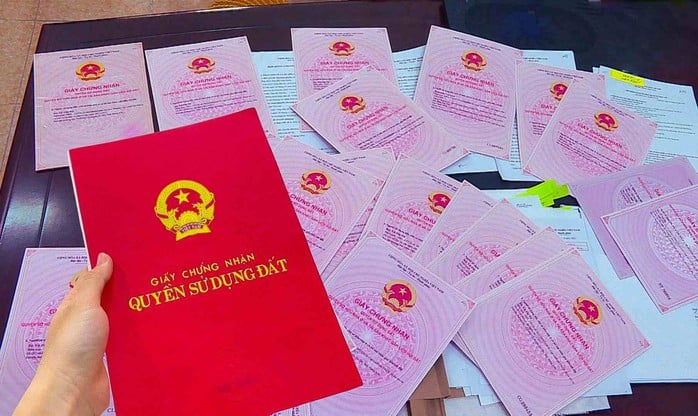The Ho Chi Minh City Institute of Resource and Environmental Economics recently submitted a proposal to the Prime Minister, the Ministry of Agriculture and Environment, and the Ho Chi Minh City Party Committee regarding the replacement of paper land ownership certificates with a digital version.
According to the Director of the Institute of Resource and Environmental Economics , this proposal stems from the spirit of Resolution 57 on national digital transformation and the land database project of the Ministry of Agriculture and Environment. Furthermore, current practice shows that managing assets through paper land ownership certificates is revealing many limitations such as loss, forgery, cumbersome administrative procedures, and a lack of transparency in transactions.
The issuance of electronic land ownership certificates, integrated with encrypted identification, replacing traditional paper documents, not only helps to manage more efficiently but also increases transparency in land-related transactions.

Most experts and businesses agree with the proposal to digitize land ownership certificates.
In a conversation with us, an expert in the finance and technology sector stated that integrating land plot and map information into the VNeID citizen identification application will bring many benefits. Citizens will find transactions more convenient; government agencies will also find it easier to manage planning, collect taxes, and prevent fraud. Digitization saves time and costs, and aligns with the trend of electronic notarization and the development of a digital government .
However, this expert also noted that the major challenge currently lies in the lack of synchronization in land databases. The situation of scattered and incomplete data, along with unresolved disputes, requires synchronized adjustments from the legal system, technical infrastructure, and the traditional paper-based document usage habits of the people.
From a technology expert's perspective, Mr. Phan Duc Nhat, Chairman of Coin.Help & BHO Network, believes that digitizing land ownership certificates is a revolutionary step in the context of strong digital transformation. He cites the successful implementation of this management model in several countries such as Estonia and Singapore, where real estate management systems have been intelligently connected with technologies such as blockchain, artificial intelligence (AI), and the Internet of Things (IoT).
Digitalization makes all information regarding ownership, transaction history, and legal status of properties clear and transparent. This will contribute to reducing the risk of fraud, limiting disputes, and promoting safer and faster real estate transactions. Instead of processing a large amount of manual paperwork, individuals and organizations only need a few clicks on a digital platform to conduct transactions, buy, sell, or mortgage.
According to this expert, digitized data also paves the way for the application of Big Data analytics and AI in asset valuation, helping investors and regulators make more accurate decisions and minimizing speculation and manipulation of real estate prices. When the market operates on a foundation of transparency and fairness, development will be more stable and sustainable.
However, to realize this solution, the Government needs to continue investing heavily in technological infrastructure, perfecting the legal framework, and ensuring information security. If these challenges are thoroughly addressed, the digitization of land ownership certificates will contribute to modernizing the real estate market, improving management efficiency, and creating a foundation for long-term development.
As someone who frequently deals with real estate documents, Mr. Vo Hong Thang, Deputy General Director of DKRA Group, strongly supports the proposal to abolish paper land ownership certificates. Integrating land ownership certificates with personal identification numbers like the Citizen Identification Card (CCCD) or Vietnam Identity Card (VNeID) not only saves costs but also synchronizes data, assisting the government in regulating the market, controlling assets, and managing taxes more effectively. Citizens only need to enter the number to access complete property information, thereby increasing transparency and convenience in transactions.
However, Mr. Thang emphasized that for successful implementation, Vietnam needs thorough preparation in terms of technical infrastructure, including management software and a synchronized database system. At the same time, a specific transition roadmap needs to be developed to avoid bottlenecks that could affect economic activities and people's rights. Mobilizing domestic technology companies to participate is a key solution for the successful implementation of the land ownership certificate digitization program.
Source: https://nld.com.vn/co-can-thiet-bo-so-hong-giay-196250528145722741.htm




![[Photo] National Assembly Chairman Tran Thanh Man visits and works with the National Assembly Committees and the State Audit Office.](https://vphoto.vietnam.vn/thumb/1200x675/vietnam/resource/IMAGE/2026/02/23/1771848141941_ndo_br_bnd-6798-jpg.webp)


































































































Comment (0)